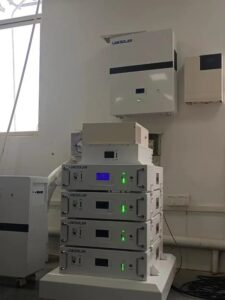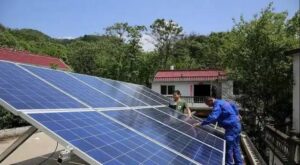The household energy storage system is mainly used to store the excess power generated by the solar panel into the battery pack, which is convenient for families to use at any time. In the daytime. When the sunlight is normal, the solar photovoltaic module generates more energy, which can be stored by the battery to ensure the power at night or on another cloudy or rainy day. It is precisely because the battery can optimize the use of electricity that it can ensure the effective operation of the entire family pure that system. At the same time, if the household electricity is suddenly suspended, such as the desktop computer drawings have not been saved in time, the fresh food in the refrigerator may be melted, and may deteriorate. But with the household energy storage system, it can maintain continuity in this case, and the response time is extremely short. The household energy storage system makes solar panel power generation more reliable, avoiding the disadvantage of not being able to generate electricity in rainy days. Influenced by the world energy crisis, these systems are becoming more and more popular, accepted and loved by everyone. While protecting the environment, they can save energy and generate electricity sustainably.

Solar energy storage,The household energy storage system includes the following components:
1. PV (light flexible solar panel or folding integrated panel)
2. Inverter or multi-function inverter (can be selected according to your own needs)
3. WIFI module or 4G module (slightly different at home and abroad)
4. Battery energy storage battery (divided into wall mounted, floor mounted roller type, and battery assembly disassembly type, which are selected according to their own power consumption. According to the power consumption, the main houses in Europe are made of wood, and the weight of wall mounted type may be considered)

Finally, summarize the advantages and disadvantages of household energy storage: advantages of household battery system
Reduce emissions – reduce pollution and demand in power grids that rely on coal and natural gas
Power failure safety – provide backup power supply in case of power failure or emergency
Cost reduction – save money by using less grid energy (for domestic energy stressed areas, cost related issues can be ignored, while for foreign countries, their electricity charges may be 10 times higher than domestic ones)
Become energy independent – store excess solar energy to reduce grid usage
Reduce peak demand – support the grid and provide grid stability services during peak hours
Disadvantages of household battery system
Higher upfront costs – more total system costs
If you want to know more about household energy storage systems, please contact us,huanqikj@163.com.




